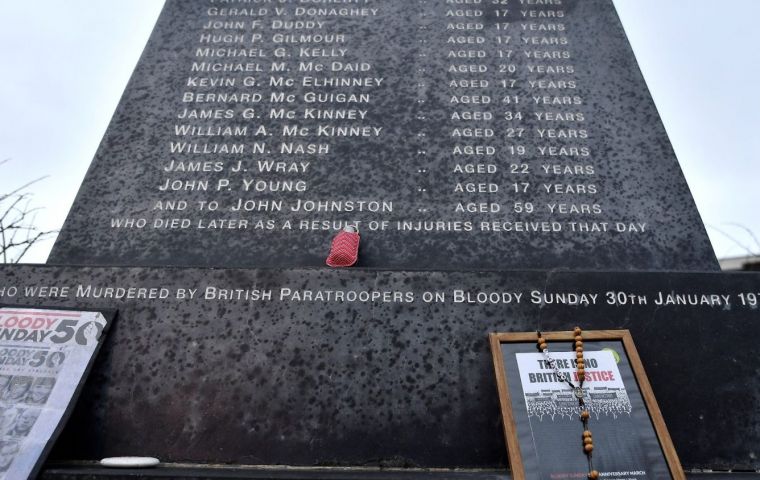MercoPress. South Atlantic News Agency
Northern Ireland recalled 50th anniversary of Bloody Sunday, when 14 Catholic marchers were killed by paratroopers
 The march concentrated at the Bloody Sunday monument, where the killings occurred, with children carrying white roses and portraits of the victims.
The march concentrated at the Bloody Sunday monument, where the killings occurred, with children carrying white roses and portraits of the victims. Northern Ireland recalled in silence the 50th anniversary of the Bloody Sunday massacre when British paratroopers killed fourteen unarmed Catholic protestors in downtown Londonderry. In a poignant procession families of the victims retraced the original 1972 civil rights march through the city with crowds lining the streets in a show of respect and solidarity.
The march concentrated at the Bloody Sunday monument, where the killings occurred, with children carrying white roses and portraits of the victims.
But it was not all silence and respect. In the divided city, Protestant Unionist hardliners flew flags of the British Parachute Regiment, ahead of the march.
Relatives of the victims have been demanding justice but so far no one soldier or officer has been convicted for the murders.
The names of victims were read out to the mournful notes of an Irish Flute.
Michael McKinney, whose brother William was among those killed, said the UK government was “scared” of allowing any prosecutions of the soldiers for fear of what a trial might uncover. But addressing the remembrance service, he stressed: “We will not go away and we will not be silenced. We shall overcome.”
The annual memorial service was attended for the first time by an Irish premier, as Taoiseach Micheal Martin joined other dignitaries in laying a wreath.“I believe that the full process and justice of the courts should be deployed,” Martin told reporters after meeting the relatives in private.
Besides the Taoiseach, also attending were Irish foreign minister Simon Coveney, and political leaders, Sinn Fein president Mary Lou McDonald and the SDLP Comum Eastwood, All of them with flower wreaths.
The killings were one of the darkest episodes in the conflict between Northern Ireland's Catholic nationalists — who want a united Ireland — and Protestant unionists loyal to Britain.
They occurred during a march on January 30, 1972, in opposition to the detention without trial of Catholic nationalists during the so called Troubles that began four years earlier.
Despite a ban on protesting, more than 15,000 people set off from a housing estate towards the city center. When youths began throwing stones at a British army barricade, the troops were ordered to move in.
A few minutes later, soldiers started firing, killing 13 people and injuring 15 others A couple of days later a fourteenth marcher died in hospital.
The soldiers claimed to have been attacked by nail bombs and gunfire and insisted they aimed away from the demonstrators.
While their claims were accepted in the official report published later that year, they were not backed up by independent accounts.
The victims' families derided the report as a “whitewash,” and the killings spurred recruitment to the Provisional Irish Republican Army (IRA), the paramilitary group fighting for reunification with Ireland.
The IRA stepped up its campaign of terror in Northern Ireland, the British mainland and abroad, which lasted until 1998 — the same year as the signing of the Good Friday Agreement peace deal.
The UK government apologized in 2010 after a second official inquiry found that the soldiers fired without justification on unarmed, fleeing civilians and then lied about it for decades.
The 5,000-page report, which followed a 12-year inquiry, concluded that the protesters posed no threat, and that the soldiers' commander on the ground violated his orders.
But five decades on, relatives are still searching for the justice they believe is needed for a scarred society to heal. An only former paratrooper was charges in 2019 fro the killing of two protestors and injuring four others.
But last year, the current British government announced a plan to halt all prosecutions of soldiers and militants in a bid to draw a line under the conflict.
The decision has angered victims' families and has been rejected by all the main political parties in Northern Ireland.
UK Prime Minister Boris Johnson told Parliament on Wednesday that Bloody Sunday was “one of the darkest days in our history” and that the country “must learn from the past.”
But animosity and anger among the two communities remains deep, and the controversy over some of Brexit clauses has aggravated the situation, with the sporadic return of again terrorist actions.




Top Comments
Disclaimer & comment rulesCommenting for this story is now closed.
If you have a Facebook account, become a fan and comment on our Facebook Page!